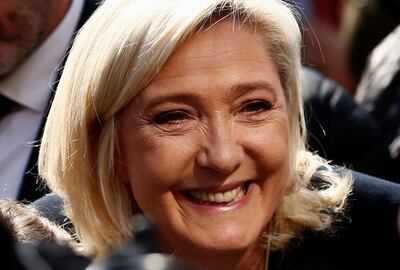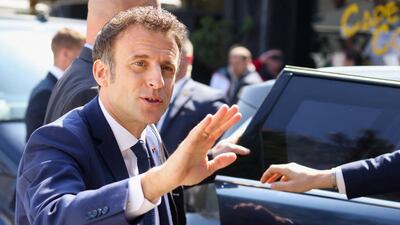French President Emmanuel Macron and his far-right challenger Marine Le Pen cast their votes today as polls pointed to a win for the incumbent in an election that could dramatically change the futures of France and Europe.
Mr Macron, 44, the centrist candidate, cast his vote in the seaside town of Le Touquet after a confident televised debate against rival and vigorous late campaigning appeared to have solidified his lead over his Eurosceptic rival.
Ms Le Pen, who toned down her nationalist party’s anti-migrant policies to try to woo undecided voters, told supporters that she was “serene” about the outcome of the run-off after arriving at a polling station in Henin-Beaumont, northern France.
"I have confidence in the French,” she said.

Opinion polls in recent days gave Mr Macron a solid and slightly increased lead from 6 to 15 percentage points in a straight fight between the pair who headed a first round of voting two weeks ago.
Analysts said that the final count would depend on those still weighing up anxiety about the implications of a far-right presidency against anger at Mr Macron's record since his 2017 election.
A victory for Ms Le Pen would cause a political upheaval on the scale of Brexit or the US election success of Donald Trump in 2016 ― and would threaten the future of the European Union.
In contrast to Ms Le Pen, Mr Macron is one the 27-nation bloc’s biggest champions and has a vision for an ambitious future with a more muscular foreign policy and a common stance on immigration.
Mr Macron, who beat Ms Le Pen in the last presidential election five years ago, has warned of "civil war" if his challenger — whose policies include a ban on wearing Muslim headscarves in public — is elected.
Ms Le Pen, who has been criticised by Mr Macron for her past admiration of Russian president Vladimir Putin, rejects accusations of racism.
She said her plans to give priority to French citizens for social housing and jobs, and scrap a number of welfare benefits for foreigners, would benefit all citizens of whatever religion.
She has focused her campaign on the rising cost of living in the world's seventh-largest economy, which many French say has worsened with the surge in global energy prices. She has also zeroed in on Macron's abrasive leadership style, which she says shows an elitist contempt for ordinary people.
Even if Mr Macron wins, he faces a difficult second term with protests likely over his plan to continue pro-business reforms, including raising the retirement age from 62 to 65.
If she unseats him, Ms Le Pen would seek to make radical changes to France's domestic and international policies.
The first immediate challenge after Sunday for the two leaders is parliamentary elections in June to secure a workable majority to fulfil their programmes.


